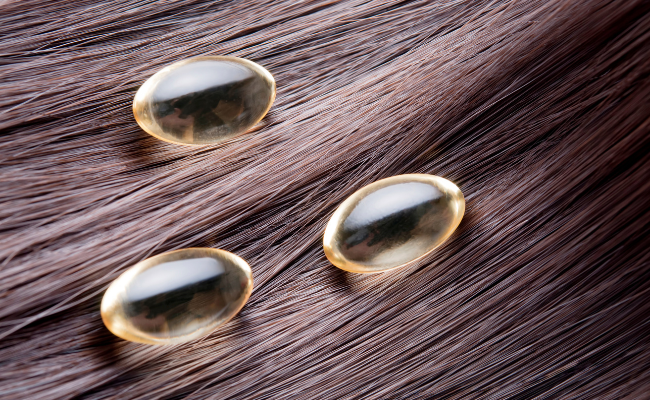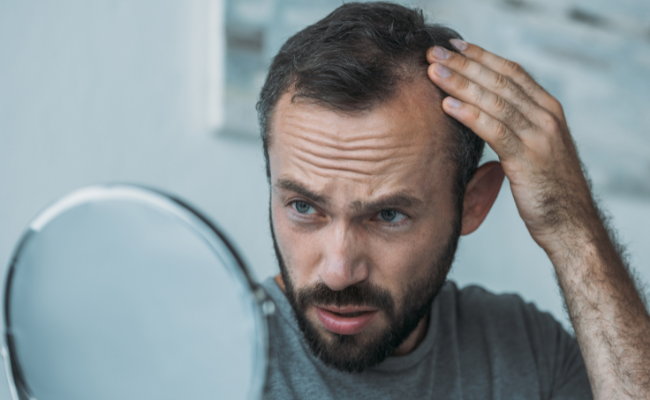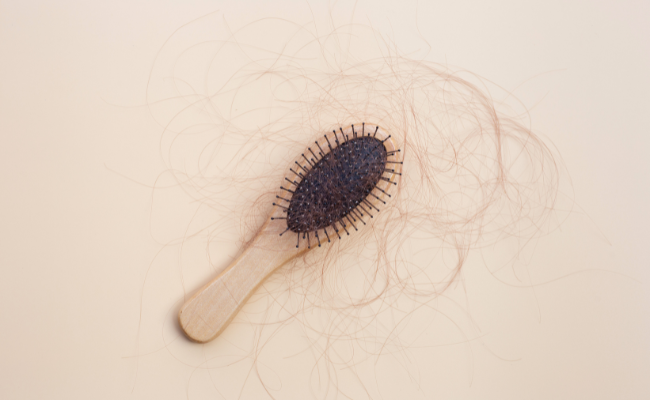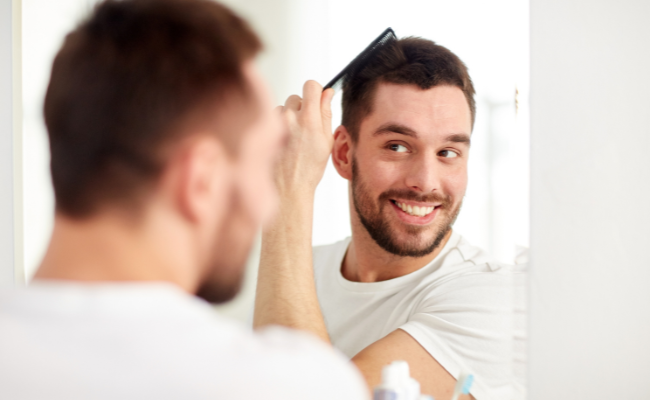Hair Loss and Vitamin Deficiencies: What You Need to Know
Do you have more hair than usual in your brush, getting thinner on top or noticing more of the scalp when you look in the mirror?
If so, you may be one of many people experiencing hair loss. While it’s a natural part of life for everyone eventually, if it begins to happen too soon, it could point to an underlying issue like a vitamin deficiency.
Knowing some important information about today’s most common deficiencies – such as Vitamin D and B12 – will prove extremely helpful in determining why this is happening and what can be done about it. Read on to learn more!
Understanding the Link Between Vitamins and Hair Loss

As we said earlier, hair loss and vitamin deficiency are interwoven. The absence/deficiency of specific vitamins would invariably result in unhealthy hair.
How Vitamin Deficiencies Can Cause Hair Loss
Deficiency in different types of vitamins has other effects on hair health. For example, Vitamin D deficiency can lead hair follicles into a resting phase, leading to hair thinning or loss.
Also, a Vitamin B7—biotin deficiency would weaken the hair shaft and lead to brittle and easily broken hair. An adequate presence of these vitamins in your daily diet can help to avert these effects.
Overview of the Key Vitamins for Healthy Hair Growth
All Vitamins play an important role in maintaining healthy hair growth. Vitamin A is responsible for sebum production—the enzyme that keeps the hair moisturized and healthy.
The adequate presence of Vitamin D in the body prevents hair follicles from entering the resting phase. Furthermore, Vitamin E fosters fluid blood circulation, delivering oxygen and nutrients to hair follicles.
Vitamin B7 (biotin) makes the hair stronger and prevents breakage. Vitamin C helps the body produce collagen—which is important for hair growth.
Common Vitamin Deficiencies Behind Hair Loss
All Vitamins, when deficient, harm hair health; some might not be as intense as others. Below we’ll be looking at how some Vitamin deficiency causes Hair loss:
Vitamin D Deficiency and Hair Loss
Vitamin D is a fat-soluble vitamin obtained from the diet or synthesized in the skin. It needs to be enzymatically activated to become biologically active.
Adequate serum levels of vitamin D are important for maintaining healthy calcium and phosphorus levels and have anti-inflammatory and immunoregulatory effects.
Vitamin D also plays a role in hair growth and differentiation by binding to the vitamin D receptor in keratinocytes. Low Vitamin D levels have been linked to several autoimmune diseases.
Some of these include hair loss disorders like vitamin D-dependent rickets type II and hereditary vitamin D-resistant rickets and alopecia.
Eating enough protein-rich meals and Vitamin D supplements can avert the effects of this deficiency.
Biotin Deficiency and Hair Loss
Vitamin B7, or Biotin, is a vital co-factor for five carboxylases that metabolize fatty acid, glucose, and amino acid. These protein enzymes are essential in forming healthy hair through cell growth and gene regulation.
Biotin deficiency is one of the major causes of Hair loss and can be fatal in most cases. Biotin can be found in dietary proteins and clinical supplements and is stored in the small intestine and liver after being broken down into free biotin.
Moreover, Biotin deficiency can be genetic or acquired, with the neonatal and infantile forms being genetic and potentially life-threatening.
Acquired biotin deficiency can result from increased raw egg consumption, malabsorption, pregnancy, alcoholism, medication use, and other factors.
Iron Deficiency and Hair Loss
Iron deficiency, or Anaemia, is another major cause of hair loss. The shortage of iron in the body would reduce the production of hemoglobin, which carries oxygen and essential nutrients to the body’s tissues.
Hair follicles require this oxygen and nutrients to grow and stay alive. Iron deficiency often leads to telogen effluvium, which causes hair follicles to enter the resting phase of the hair growth cycle prematurely.
Telogen effluvium leads to excessive shedding and weakening of hair and then balding in the long run. An adequate inclusion of Vitamin C and iron supplements in your daily diet can avert the effect of iron deficiency on your hair health.
Other Vitamin Deficiencies Linked to Hair Loss
Other Vitamins like Vitamin A, C, and E can also be linked to hair loss cases. Balanced eating to contain these vitamins in appropriate quantities can help avoid these vitamins deficiency.
Maintaining a Balance of Vitamins for Healthy Hair
Let us look at some of the topics related to maintaining healthy hair growth:
Importance of a Balanced Diet for Healthy Hair Growth
We saw earlier that the major cause of most hair loss cases is the deficiency of certain Vitamins. A balanced diet gives the body the essential nutrients it needs to produce healthy hair.
This includes a variety of vitamins and minerals or protein sources. Generally, a Balanced diet helps to form stronger tissue and strengthen hair follicles.
Eating a healthy, balanced diet also helps prevent other deficiency-related sicknesses that may have hair loss as a symptom.
Supplements and Vitamins for Hair Growth
Supplements and vitamins such as biotin, vitamin D, iron, zinc, and omega-3 essential fatty acids are commonly prescribed for healthy hair growth.
These nutrients provide the body with the necessary building blocks for strong and healthy hair.
The Role of Exercise and Stress Management in Healthy Hair Growth
Exercise and stress management are also great ways of promoting healthy hair growth. Regular exercise improves blood circulation to the scalp, fostering active hair follicles.
Exercise also helps strengthen the red blood cells, strengthening the immune system. Participating in stress reduction techniques can help prevent hair loss by preventing damage to hair follicles, leading to stronger and healthier hair.
Identifying and Addressing Other Causes of Hair Loss
Apart from deficiency of certain vitamins, other biological and mental conditions might cause hair loss. Some of them are:
Hormonal Imbalances and Hair Loss
Hormonal imbalances can cause hair loss by distorting the normal growth cycle of hair follicles.
Hormones like testosterone and dihydrotestosterone (DHT) can squeeze hair follicles and reduce the anagen—growth phase of the hair cycle.
It leads to thin and weak hair that eventually falls out. Hormonal imbalances can also cause inflammation that damages hair follicles which can cause baldness.
Genetics and Hair Loss
Genetics is another uncontrollable cause of hair loss. Certain genes can make individuals more susceptible to male or female pattern baldness.
These genes can manipulate the sensitivity of hair follicles to hormones like DHT and Testosterone, which can cause baldness.
Medical Conditions and Hair Loss
Conditions like alopecia areata, scalp infections like ringworm, and thyroid disorders.
Medical treatments like chemotherapy can also lead to hair loss by damaging hair follicles. Treatments for these conditions depend on the underlying cause.
Taking Control of Your Hair Health
Rather than panic about your hair falling off, there are simple measures you can take to get stronger hair.
Summary of Key Points Covered in the Guide
Hair loss can be very embarrassing for anyone to go through and can also be a scary condition. But you must know that not every hair loss case is linked to a fatal sickness.
It could be genetics, vitamin deficiency, or stress. And with little effort, you can tackle all these conditions.
Conclusion
Ensuring healthy hair growth involves lifestyle changes, proper nutrition, and medical treatment when necessary.
Eating a balanced diet daily, stress management, and avoiding harsh chemicals on hair are sure ways to promote healthy hair growth. Seeing a doctor is also essential for getting an accurate diagnosis of the cause of your hair loss.






